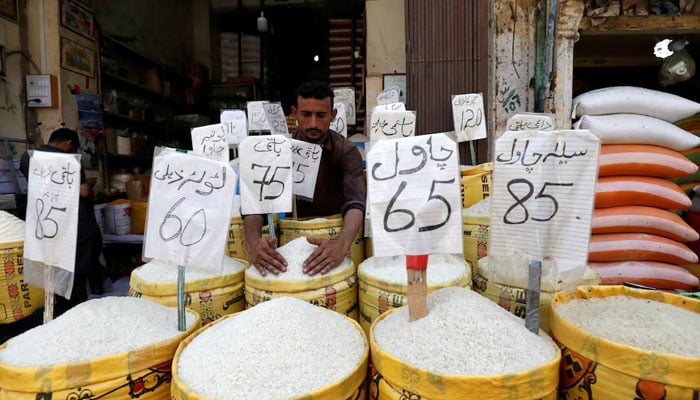Alarm over detection of GMO in Pakistani rice shipped to EU
Source of contamination has reportedly been linked to government laboratories in Germany and Luxembourg
LAHORE: Detection of Genetically Modified Organism (GMO) in rice shipment destined for EU has rung alarm bells in export circles.
According to notification of European Commission through its official website, an organic basmati rice consignment imported from Pakistan through The Netherland has been contaminated by genetically modified rice. Sampling of the product categorized as cereals and bakery product was taken on July 31, 2024 by European Union authorities and it was found to be hazard (genetically modified — unauthorized - genetically modified), declaring potential risk about the consignment.
Subsequently, EU Rapid Alert System for Food and Feed (RASFF) notified on August 2, 2024 about the discovery. The source of the contamination has reportedly been linked to government laboratories in Germany and Luxembourg.
Earlier in June 2021, a shipment containing 500 tonnes of GM rice from India was also detected. Similarly, Pakistan tightened regulatory checks on cargoes to curb GM rice trade back in early 2018. The move was aimed at getting rid of any impression of involving in the trade of tainted genetically modified (GM) rice.
Consequently, federal government issued instructions to Department of Plant Protection, Ministry of Food Security & Research (MFS&R) in April 2018 for strict regulation of inbound and exporting rice consignments. The action was then initiated following serious concerns raised by Rice Exporters Association of Pakistan (REAP) about incidence of detecting GM rice from some shipments, resulting in rejection of exporting consignments from European Union.
Echoing similar concerns, Punjab government on April 10, 2018 wrote a letter to express strong reservations about tainted trade of GM rice.
As a result of the tight regulation, Pakistan blocked entry of a Chinese rice seed shipment in 2018, prompting Chinese Embassy in Islamabad to raise the issue with the Minister Food Security & Research. The Chinese diplomat wrote in the letter dated April 19, 2018 that a shipment of more than 2,000 tons of hybrid rice seed is being stuck in the Karachi port and prohibited from entering into Pakistan due to the negative results of GMO testing.
It may be noted that rice is second most important food crop of Pakistan and is famous export commodity in European countries. These countries do not allow GMO for human consumption as they have some serious human health concerns about genetically modified organism, showing zero tolerance policy for GMO rice entry into EU countries.
Because of food related health concerns and strategic importance of this crop, Pakistan too has zero tolerance policy for R&D and import / export of GMO rice. However, weak regulatory framework may cause lapse in this connection.
It a related development, it may be worth mentioning that University of Agriculture, Faisalabad recently conducted GM sugarcane trial that attracted stiff opposition from various circles. They were of that GM technology have been proved to be a health risk for human consumption.
-
 Japan: PM Takaichi Flags China ‘Coercion,’ Pledges Defence Security Overhaul
Japan: PM Takaichi Flags China ‘Coercion,’ Pledges Defence Security Overhaul -
 Angorie Rice Spills The Beans On Major Details From Season 2 Of ' The Last Thing He Told Me'
Angorie Rice Spills The Beans On Major Details From Season 2 Of ' The Last Thing He Told Me' -
 Questions Raised Over Andrew Mountbatten-Windsor's Line Of Succession
Questions Raised Over Andrew Mountbatten-Windsor's Line Of Succession -
 'Shameless' Sarah Ferguson 'pressuring' Princess Eugenie, Beatrice For Major Reason
'Shameless' Sarah Ferguson 'pressuring' Princess Eugenie, Beatrice For Major Reason -
 Teacher Arrested After Confessing To Cocaine Use During Classes
Teacher Arrested After Confessing To Cocaine Use During Classes -
 Paul McCartney Talks 'very Emotional' Footage Of Late Wife Linda In New Doc
Paul McCartney Talks 'very Emotional' Footage Of Late Wife Linda In New Doc -
 Princess Beatrice, Princess Eugenie's Response To Andrew's Arrest Revealed
Princess Beatrice, Princess Eugenie's Response To Andrew's Arrest Revealed -
 King Charles And Princess Anne Bestow Honours At Windsor Castle
King Charles And Princess Anne Bestow Honours At Windsor Castle -
 King Charles 'worried' As Buckingham Palace, Royal Family Facing 'biggest Crisis'
King Charles 'worried' As Buckingham Palace, Royal Family Facing 'biggest Crisis' -
 Milo Ventimiglia Recalls First Meeting With Arielle Kebbel On The Sets Of 'Gilmore Girls' Amid New Project
Milo Ventimiglia Recalls First Meeting With Arielle Kebbel On The Sets Of 'Gilmore Girls' Amid New Project -
 Eric Dane Infuriated After ALS Diagnosis As He Feared The Disease Would Take Him Away From His Girls
Eric Dane Infuriated After ALS Diagnosis As He Feared The Disease Would Take Him Away From His Girls -
 It's A Boy! Luke Combs, Wife Nicole Welcome Third Child
It's A Boy! Luke Combs, Wife Nicole Welcome Third Child -
 Leading Astrophysicist Shot Dead At Southern California Home
Leading Astrophysicist Shot Dead At Southern California Home -
 Johnny Depp's Kind Gesture Towards Late 'Grey's Anatomy' Actor Eric Dane Before Death Laid Bare
Johnny Depp's Kind Gesture Towards Late 'Grey's Anatomy' Actor Eric Dane Before Death Laid Bare -
 How Princess Eugenie, Beatrice React To Andrew Arrest?
How Princess Eugenie, Beatrice React To Andrew Arrest? -
 Kylie Jenner 'convinced' Gwyneth Paltrow Is 'crushing' On Timothee Chalamet: 'It's Disrespectful'
Kylie Jenner 'convinced' Gwyneth Paltrow Is 'crushing' On Timothee Chalamet: 'It's Disrespectful'




